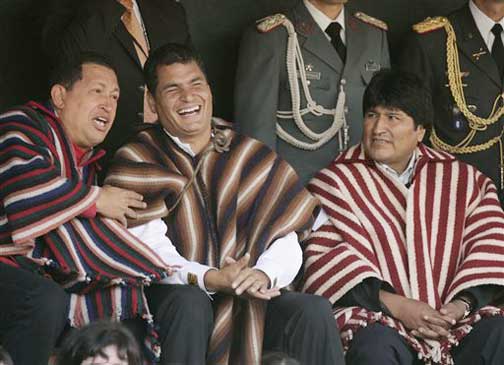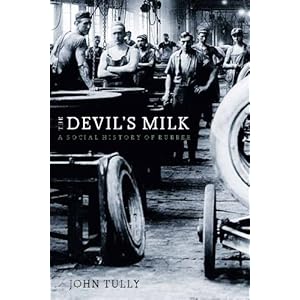Brazil
NO REDD+! in Rio+20: A declaration to decolonise the earth and the sky

“Against Amazonian Genocide.
Climate Connections, June 18, 2012 -- What’s wrong with the green economy?: Joanna Cabello of Carbon Trade Watch at Rio+20.
For more coverage of the Rio+20, click HERE.
By Patrick Bond, Rio de Janeiro
June 18, 2012 -- Links International Journal of Socialist Renewal, a version of this article also appeared at Climate and Capitalism -- Given the worsening world economic crisis, the turn to "Green Economy" rhetoric looms as a potential saviour for footloose financial capital, and is also enormously welcome to those corporations panicking at market chaos in the topsy turvy fossil-fuel, water, infrastructure construction, technology and agriculture sectors.
On the other hand, for everyone else, the Rio+20 Earth Summit underway this week in Brazil, devoted to advancing Green Economy policies and projects, appears as an overall disaster zone for the people and planet.

Rio de Janeiro, June 14, 2012 -- La Via Campesina -- About 3000 people from around the world will mobilise to say NO to the commodification of life and nature at the "Peoples Summit for Social and Environmental Justice and in Defense of the Commons", the parallel opposition activity to the UN Conference on Sustainable Development or Rio+20.
The peoples' summit is a space for discussion, debate and construction of alternative proposals by the global civil society, social movements and peoples collective organisations. La Via Campesina -- the international organisation of small farmers -- has been actively participating in the construction of this activity in order to denounce the false solutions of the same failed economic model that are now being dressed in green under the name “green economy”. La Via Campesina is instead promoting peasants' sustainable agriculture as a true solution to the global climatic and environmental crises.
Latin America’s new left in power: the governments of Hugo Chavez, Evo Morales and Rafael Correa

Presidents Hugo Chávez (Venezuela), Rafael Correa (Ecuador) and Evo Morales (Bolivia).
New book reveals the history of rubber: holocausts, environmental destruction and class struggle

The Devil’s Milk: A social history of rubber
By John Tully
Monthly Review Press, 2011
[Order the The Devil’s Milk from Monthly Review Press HERE. John Tully launched the book in Melbourne on February 17, at Readings Books, Carlton (309 Lygon St). He will also launch it in New York City on February 22, 7.30pm, at The Brecht Forum, 451 West Street.]
February 18, 2011 – Links International Journal of Socialist Renewal -- This new book from Monthly Review Press – by Australian socialist John Tully -- documents the history of rubber and the role it has played in the development of capitalism.
Rubber is an essential industrial material, although underappreciated by most of us, even though we are surrounded by it. Since its industrial uses began to be fully appreciated in the 1800s, the quest for rubber has been, in Tully’s words, “a paradigm of imperialism”.
Haiti: Diplomat delivers searing indictment of occupation regime

January 9, 2011 -- Socialist Voice -- Of all the commentaries and interviews coinciding with the anniversary of Haiti’s earthquake, none are likely to exceed in significance the interview granted by Organization of American States representative to Haiti, Ricardo Seitenfus, to the Swiss daily Le Temps on December 20, 2010.
The critique he delivered to the newspaper is especially significant for Latin America and the Caribbean because Seitenfus is Brazilian. Sensitivity is running high in the region over the evident failure of the international relief effort led by the big powers – the United States, Canada and Europe – whose interventionist policies had already done so much harm to Haiti before this latest catastrophe.
The state, social movements and revolution in Latin America

By Federico Fuentes
November 28, 2010 -- Green Left Weekly -- It should come as no surprise that Latin America, a region converted into a laboratory for ongoing experiments in social change, has increasingly become the topic of discussion and debate among the broader left.
Latin America has not only dealt blows to imperialism but also raised the banner of socialism on a global scale. It is of strategic importance for those fighting for a better world, especially at a time when capitalism is in systemic crisis.
Latin America’s landscape of powerful social movements, left governments of various shades, revolutionary insurrections, and growing expressions of indigenous resistance and worker control, provides a perfect scenario for leftists to learn about, and debate, revolutionary strategy and tactics.
This should not simply be an academic debate. It should look at how to best build solidarity with these movements for change and gain insight for struggles at home.
Of late, burning dispute has opened up, mostly among those writing from an anti-capitalist orientation: a debate over the complex relationship, or “dance” as Ben Dangl calls it, between social movements and states in Latin America.
`South of the Border': An Interview with Oliver Stone & Tariq Ali

July 28, 2010 -- www.alborada.net -- Oliver Stone’s new documentary South of the Border chronicles the emergence of progressive governments in Latin America, their quest for social and political transformation and their growing independence from Washington. Roberto Navarrete interviews Oliver Stone and Tariq Ali (one of the film’s scriptwriters) to find out some background.
Brazil: Left workers’ unity attempt fails

By Raul Bassi
July 11, 2010 -- An attempt to forge greater unity among militant union sectors in Brazil has imploded. The Working Class Congress (Conclat) was held in Sao Paulo on June 5-6 to try and bring together various radical union currents. The key forces behind the congress were Conlutas and Intersindical, both formed in opposition to the main union confederation, the Unified Workers’ Confederation (CUT).
The CUT unites approximately 60 million formal or informal workers out of a total population of 200 million, making it the biggest workers confederation in the continent. The CUT has had a very close relationship with the governing Workers Party (PT), both during its period of ascendency as it emerged out of the militant workers' struggles of the 1970s, as well as during its transformation to what it is today.
Has the World Social Forum been co-opted by capitalism? Does it have a future?

March 3, 2010 -- Olivier Bonford and Eric Toussaint are members of the International Council of the World Social Forum (WSF) and of the the Committee for the Abolition of the Third World Debt (CADTM). In this interview with Marga Tojo Gonzales, they discuss the future and role of the World Social Forum as it enters its second decade. They also examine the relationship between the WSF and the call for a Fifth Socialist International by Venezuela's Hugo Chavez. Translated by Vicki Briault and Christine Pagnoulle.
* * *
Ten year after the first use of the slogan, "Another world is possible", a majority of humankind still lives in subhuman conditions, and with the international financial crisis, the situation has become even worse. Does this mean that the alternative globalisation movement has failed?
Beyond the World Social Forum ... the Fifth International
Eric Toussaint interviewed by Igor Ojeda for the Brazilian weekly paper Brasil de Fato. Translated from French by Judith Harris and Chris
